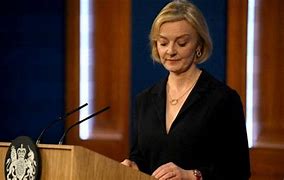
The shortest-serving prime minister in British history. She went after days of absolute mayhem at Westminster. Everywhere people are lining up to say that this represents some kind of democratic collapse. And everywhere, those people are wrong.
At worst we see the conspiracy theorists of the right branding this a “globalist coup”, orchestrated by bankers and liberals against a brave leader who only wanted to do the people’s will.
So let’s start with a bit of basic perspective. Although Liz Truss said on the damp doorstep of Downing Street on the day she resigned that that she had a mandate, it was only from a minority of Conservative Party members. For her radical economic experiment, she had no popular mandate at all.
The “mini-Budget” that began all this? Nobody voted for that. A bonfire of environmental regulations and workers’ rights leading to “Singapore-on-Thames”? That never appeared in a manifesto. Nobody voted for that.
Today has seen an ambulance and fire-service operation after the crash of an experimental aircraft that was never popular and which, confronted by the gravity of the real world, promptly nosedived.
For Conservative MPs, who were elected with a big majority in 2019 on a different manifesto, to demand the resignation of this prime minister was therefore completely legitimate – just as it was legitimate for them to refuse to serve under Boris Johnson after the lies and law-breaking in Downing Street.
It’s a parliamentary democracy. In judging and penalising failure, MPs are the court of last resort. Until, of course, the rest of us get our say in the general election. Logically, Keir Starmer’s demand for one is absolutely right. The only trouble is it’s become even more unlikely.
The reason? The opinion polls, obviously, which suggest the Conservatives would be almost wiped out, or at least gutted as a serious political force. If you are a Tory MP you are, as it were, standing on the ledge of a high building. Labour is proposing that you take a step forward. so you are thinking very hard of reasons not to.
I sound flippant but for Conservative MPs this is intimate. One went into the members’ tearoom earlier this week and revealed that his young children, having heard the evening news, had asked him at breakfast if the family would have to sell the house when he lost his job. So no, however bad things seem, it’s unlikely that Tory MPs will vote for an early general election – particularly now when, for the first time in weeks, there is a dimly lit path to a future in which some of them may survive.
That path means putting together a cabinet that represents all wings of the Conservative Party, calms the markets, and makes the tax rises and spending cuts Jeremy Hunt has demanded, in the most moderate and least cruel way possible, while limping on in the hope that something turns up.
And with a loud, rude noise into this scenario come rumours that Boris Johnson wants to run again. That would be an invitation to return to the recent, riotous past. And, readers may recall, there was a reason why the Conservatives had to go through that summer leadership election.
Johnson could at least cite the democratic mandate he won in 2019, he was a winner (which is not a small matter).
But so many of his own MPs have said so many disobliging things about him that it’s hard to see how the party could possibly unite under a man they know all too well. The wounds are raw.
Rishi Sunak was, of course, the political victor of the Kwasi Kwarteng-Truss car crash. But, hurt by his failure in the leadership election, he has been lying low – perhaps too low, for too long. He now sees Penny Mordaunt, fresh from a strong performance in the Commons last week, gathering support among MPs quickly.
Now, given the state of the economy after the latest crash, and indeed after the past two decades, it seems highly unlikely that an administration under Sunak, Mordaunt or Johnson could deliver new cuts without a disastrous impact on the country and further turmoil in parliament. Even under a new prime minister this won’t be, by any stretch of the imagination, a popular Tory government.
Looking ahead, as people contemplate double-digit inflation and higher mortgage payments, voters will not be in a forgiving mood. And so this would, almost certainly, be a doomed project.
But the doom would be postponed and… something might turn up. Vladimir Putin might have a funny turn and the gas price might tumble. Or the Russians might unleash new horrors and the political atmosphere across the West, including in Britain, could dramatically change.
The past few days have been gripping, embarrassing, funny and humiliating in turn. But that is parliamentary democracy, not a globalist plot against the people. It is a fast-moving, all too human, ragged way of dealing with political success and failure.
Today, after only a few weeks, it has confronted a failed experiment and decided to try something else. The rest of us might decide we don’t like that something else. But this is the system working, not failing.
- The New Statesman report











